A comparison of the most important Bitcoin payment providers
Comparison of the most important Lightning and Bitcoin payment providers
Anyone who wants to accept Bitcoin payments from their customers in their online store or on the Internet uses the services of a Bitcoin payment provider, also known as a Bitcoin payment service provider or Bitcoin payment processor. We have tested and evaluated the best-known Bitcoin payment providers and created a ranking list. The order of the Bitcoin payment providers can only be a rough guide, as the provision of a payment module for your own online store system will be the most important factor in your personal selection. The most important selection criteria are
- Does the Bitcoin payment provider offer a payment module for my store system?
- Are payment tools offered that allow me to accept Bitcoin payments on my website, even if I do not operate an online store?
- Are Lightning payments supported in addition to Bitcoin?
Other criteria were included in the evaluation and awarded points. The sum of the points resulted in the respective ranking. The evaluation criteria and the number of points to be awarded, according to which the ranking of the best Bitcoin payment providers was created, are explained in more detail at the end of this page.
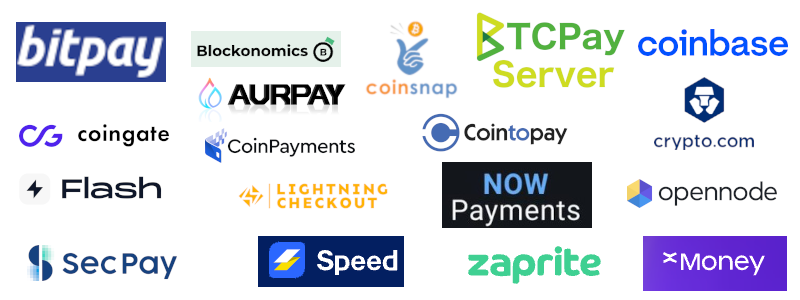
Place 1 to 8
-
-
- 1st place Coinsnap (43 points)
- 2nd place BTCPay Server (38 points)
- 3rd place Cointopay (43 points)
- 4th place Coinpayments (33 points)
- 5th place Coingate (22 points)
- 6th place Opennode (21 points)
- 7th place Blockonomics (20 points)
- 8th place Zaprite (16 points)
- 8th place Speed (16 points)
-
Place 8 to 18
- 8th place Aurpay (16 points)
- 8th place NowPayments (16 points)
- 12th place Lightning Checkout (15 points)
- 12th place Secpay (16 points)
- 12th place Bitpay (15 points)
- 15th place Flash (14 points)
- 16th place xMoney (12 points)
- 17th place Crypto.com (3 points)
- 18th place Coinbase Commerce (1 points)
YouTube Video: The 10 best Bitcoin payment providers
On the joint YouTube channel of Coincharge + Coinpages we have published a video:“Bitcoin payment providers – The 10 best Bitcoin payment providers for online stores and website operators“.
Top 20 Bitcoin payment providers
Coinsnap
Coinsnap provides numerous payment modules and payment tools that eCommerce merchants can use to receive Bitcoin and Lightning payments from their customers directly on their own Lightning wallet. As a merchant, all you need is your own Bitcoin Lightning Wallet, which is connected to the Coinsnap system via the Lightning address. Customers’ transactions are then credited directly to their own Lightning Wallet. By connecting to a Bitcoin broker, it is also possible to pay out to your own bank account.
By processing Bitcoin and Lightning payments through Coinsnap, merchants do not need to maintain and operate their own technical infrastructure.
Coinsnap does not hold customer funds at any time. All payments are routed directly to the merchants’ Lightning Wallets, just like a Lightning Routing Node.
For merchants who prefer a payout to a bank account, incoming Lightning payments are forwarded to a Lightning broker, who makes the exchange from Lightning to Euro and then pays out to the merchant’s bank account.
With the payment plugin, merchants can quickly and easily integrate Bitcoin and Lightning payments into existing store systems.
In the article: Coinsnap – Bitcoin and Lightning payment provider, Coinsnap is presented in more detail.
Bitcoin payment modules for online stores










Easy Digital Downloads, Paid Memberships Pro, GetPaid, GiveWP, WPForms, Contact Form 7, Ninja Forms, Gravity Forms, Modified Shop, Pretix, Bitcoin Paywall
Bitcoin Payment Tools




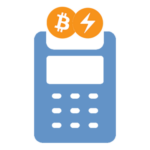
- Fees: 1% on turnover when using the discount code Coincharge, without discount code 1.25%
- Cryptocurrencies: Bitcoin and Lightning Only
- API: https://docs.coinsnap.io/
- Github: https://github.com/Coinsnap
- Location: Serbia
- Website: https://coinsnap.io
- Payout: Payout to your own Bitcoin Lightning Wallet, payout to your own bank account via Bitcoin Broker
- Special features: KYC Light
With the discount code Coincharge you save 0.25% on fees
For a limited time, Coincharge is offering a free Coinsnap integration service. Apply for the free Coinsnap integration service for all store systems supported by Coinsnap.
BTCPay Server
With a BTCPay server, you are your own payment service provider. You can install the BTCPay software on your own server and process Bitcoin payments yourself. BTCPay Server supports payment processing for Bitcoin Onchain and Lightning and can be expanded to include other cryptocurrencies.
The BTCPay Server software is provided as a free open source solution. There are also no fees for payment processing.
Bitcoin payment modules for online stores










Zapier, Grandnode, Invoice Ninja, Nopcommerce, Odoo, PhocaCart, Smartstore, VirtueMart
Bitcoin Payment Tools





- Fees: No base fee, No transaction fee, No volume.
- Cryptocurrencies: Bitcoin and Lightning.
- API: https://docs.btcpayserver.org/API/Greenfield/v1/
- Github: https://github.com/btcpayserver
- Location:
- Website: https://btcpayserver.org/
- Payout: Payout to your own Bitcoin wallet, no payout to your own bank account
- Special features:
Own Bitcoin payment processing on own server,
Everything under own control,
No KYC,
No fees
Cointopay
Cointopay is a Czech payment processor that has been on the market since 2014. More than 30,000 merchants use Cointopay’s crypto payment processing. More than 80 different cryptocurrencies are supported, including Bitcoin, Lightning, Monero, Tether and Ethereum.
A variety of payment modules are also offered to enable simple integration into your own store system. Incoming crypto sales can be paid out to the Cointopay wallet, to the merchant’s bank account, Paypal and Payeer.
Bitcoin payment modules for online stores








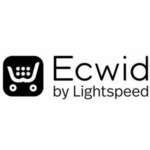

Box Billing, odoo, blesta, WP Easy Digital Download, zencart, osCommerce, Xcart, Membership Pro, Arastta, cs.cart, Joomla, Ubercart
Bitcoin Payment Tools



- Fees: Fee of 1.0102 % on each incoming transaction. The fees can also be borne by the customer/payer or split between them.
- Cryptocurrencies: More than 80 Coins. Among others: Bitcoin and Lightning, Litecoin, Dash, Dogecoin, Ether, Monero, Tether
- API: https://docs.cointopay.com/
- Github: https://github.com/orgs/Cointopay/repositories
- Location: Czech Republic
- Website: https://cointopay.com/
- Payout: Payout to your own Bitcoin wallet, payout to your own bank account. Payouts are made to bank accounts in EUR, USD or GBP as well as to PayPal and Payeer or as cryptocurrency to the Cointopay wallet.
A KYC check is required.
Coinpayments
CoinPayments is a cryptocurrency payment processing company that allows merchants to accept cryptocurrencies as a payment method. It was founded in 2013 and is headquartered in Vancouver, Canada.
CoinPayments offers a variety of features and tools for merchants, including the ability to accept Bitcoin and more than 1,800 other cryptocurrencies. The platform also supports stablecoins that are tied to the value of the US dollar.
Coinpayments is the provider with the most extensive selection of accepted cryptocurrencies. If you want to offer your customers an almost complete selection of all available cryptocurrencies, you will find what you are looking for at Coinpayments.
You can choose which cryptocurrencies you want to offer to your customers. You then specify whether you want to keep this cryptocurrency or have it automatically converted into another cryptocurrency (e.g. Bitcoin).
For those who consider it beneficial to offer as many cryptocurrencies as possible to their customers, Coinpayments is the right solution. With over 1800 different coins, Coinpayments offers a comprehensive selection of coins that can be used as cryptocurrency.
With Coinpayments, the payout is made exclusively to your own crypto wallet. A payout in Euro to the own bank account is not offered.
Bitcoin payment modules for online stores










aMember Pro, Arastta, blesta, BoxBilling, Business Directory Plugin (WordPress) Hikashop, osCommerce, TomatoCart, VirtueMart, Ubercart, x-Cart, Zen Cart
Bitcoin Payment Tools



- Fees: 0.5% on turnover.
- Cryptocurrencies: More than 80 Coins. Among others: itcoin and Lightning, Bitcoin Cash, Litecoin, Dash, Dogecoin, Ether, Monero
- API: https://www.coinpayments.net/apidoc
- Github: https://github.com/CoinPaymentsNet
- Location: Panama (PaidInSatoshi Inc., a Panama corporation.)
- Website: https://www.coinpayments.net/
- Payout: Payout to your own Bitcoin wallet, no payout to your own bank account
- Special features:
Even if the payout is made in cryptocurrency, the trader must carry out a KYC.
Coingate
CoinGate is a Lithuania-based cryptocurrency payment processing platform founded in 2014. The platform provides an easy way for online merchants and retailers to accept cryptocurrencies as a payment method without the need for extensive technical knowledge.
CoinGate supports a variety of cryptocurrencies, including Bitcoin, Ethereum, Litecoin, Ripple and over 50 different cryptocurrencies. Merchants can convert payments in cryptocurrencies directly into their local currency to minimize the risk of price fluctuations.
It is especially worth mentioning that Coingate supports Lightning payments.
Bitcoin payment modules for online stores







eshoprent
Bitcoin Payment Tools


- Fees: 1% on turnover. Withdrawals by SEPA bank transfer do not cost any fees (minimum amount €50,-). For international withdrawals (outside EU) a fee of 1% is charged.
- Cryptocurrencies: over 80 cryptocurrencies such as Bitcoin and Lightning, XRP, Stellar, Dogecoin, Litecoin, Ethereum, Bitcoin Cash,
- API: https://developer.coingate.com/
- Github: https://github.com/coingate
- Location: Lithuania
- Website: https://coingate.com/accept
- Payout: Payout to your own Bitcoin wallet, payout to your own bank account
- Special features:
Opennode
OpenNode specializes in payment processing for Bitcoin and Lightning payments. OpenNode was founded in 2018 and is headquartered in San Francisco, California, USA.
OpenNode has earned a good reputation, particularly in the area of Lightning payments, and impresses with industry-specific solutions.
Payouts can be made in Bitcoin and, for American merchants, also to a bank account. For European merchants, payout to a bank account is no longer supported.
OpenNode, a KYC must be made even if the payout is in a cryptocurrency.
Bitcoin payment modules for online stores






Bitcoin Payment Tools


- Fees: 1% on turnover.
- Cryptocurrencies: Bitcoin and Lightning Only
- API: https://developers.opennode.com/reference
- Github: https://github.com/opennodedev
- Location: USA
- Website: https://www.opennode.com/
- Payout: Payout to your own Bitcoin wallet, no payout to your own bank account in Europe possible
- Special Features: Opennode is a Bitcoin Only payment processor and supports Bitcoin and Lightning payment processing only.
Blockonomics
7th place
20 points


Blockonomics is a Bitcoin payment service provider where incoming payments are credited directly to your own Bitcoin wallet. During the registration you have to enter your xPub key.
Only Bitcoin is supported via the blockchain (onchain). No other cryptocurrencies and no Lightning.
Bitcoin payment modules for online stores







Ghost
Thirty Bees
Squarespace
Bitcoin Payment Tools


- Fees: 1% on turnover
- Cryptocurrencies: Bitcoin
- API: https://www.blockonomics.co/views/api.html
- Github: https://github.com/blockonomics
- Location:
- Website: https://www.blockonomics.co/merchants
- Payout: Payout to your own Bitcoin wallet, no payout to your own bank account
- Special features:
- No KYC
Zaprite
Zaprite enables the processing of Bitcoin and Lightning payments in your own Bitcoin or Lightning wallet. You deposit your own Bitcoin or Lightning wallet and the Bitcoin address or Lightning Invoice of the deposited wallet is displayed directly to the payer during payment processing. Zaprite does not charge a fee per transaction, but a flat fee of $25 per month, regardless of the number of transactions.
Bitcoin Payment Tools



Checkout page
- Fees: $25,- per month
- Cryptocurrencies: Bitcoin and Lightning Only
- API: https://api.zaprite.com/#post-/v1/order
- Github:
- Location: USA (Austin, Texas)
- Website: https://zaprite.com/
- Payout: Payout to your own Bitcoin wallet, no payout to your own bank account
- Special features: Zaprite is a payment processor that never comes into contact with customer funds. The payments flow directly into your own Bitcoin wallet. You receive 100% of the payments.
Speed
Speed is a Bitcoin payment processor for private individuals and companies. The solutions offered by Speed include the acceptance of Bitcoin payments, the execution of payments and the management of business processes via the Lightning Network.
Speed does not provide a payment plugin for the integration of store systems. However, individual connections can be realized via an API connection.
The comprehensive payment functions provided by Speed for the acceptance of Bitcoin and Lightning payments should be emphasized. In the area of online payments, there is the option of creating invoices and payment links that you can send to your customers so that they can pay with Bitcoin. In the area of personal payment on site (offline payments), there are QR code payments, dynamic QR payments and a point of sale app with which you can accept Bitcoin and Lightning payments in your store.
Bitcoin Payment Tools
- Fees: 1% on turnover.
- Cryptocurrencies: Bitcoin and Lightning Only
- Plugins / modules:: No plugins are offered
- Payment Tools: Invoice, payment link, Web PoS, PoS app,
- API: https://www.speed.dev/reference/introduction
- Github:
- Location: Dubai
- Website: https://www.tryspeed.com/
- Payout: Payout to your own Bitcoin wallet, no payout to your own bank account
- Special features: Large selection of payment solutions for online and offline payments with Bitcoin and Lightning
Aurpay
Aurpay is a global blockchain technology company that enables businesses of all sizes to access cross-border crypto payments via the Aurpay platform or API.
In addition to Bitcoin and Lightning, Aurpay also supports numerous other coins and stablecoins. Numerous payment modules for the most common store systems and an API for individual integration are also available.
It is not clear how customer sales are paid out.
Bitcoin payment modules for online stores







Paid Memberships Pro,
Bitcoin Payment Tools

- Fees: 0.8% on turnover,
- Cryptocurrencies: Bitcoin and Lightning, Ethereum, Dai, Tether and USDC
- API: https://documenter.getpostman.com/view/26033039/2s93CPsDE3#41a41d95-9a60-4de5-8a60-1425768e2d59
- Dokumentation: https://docs.aurpay.net/product-guides/
- Location: Hong Kong
- Website: https://aurpay.net/
- Payout: Payout to stablecoin wallet, no payout to own bank account
NOWPayments
Report to follow
Bitcoin payment modules for online stores







Zen Cart
Bitcoin Payment Tools



- Fees: 0.5% on the volume. Withdrawal fee to bank account between 1.5 to 2.3% depending on volume.
- Cryptocurrencies: Over 50 different cryptocurrencies such as: Bitcoin, Ethereum XRP, Tether, Litecoin, Bitcoin Cash, Dogecoin, Nano, Monero, Dash, Vechain, Cardano, Shiba Inu, Binance USD, DAI, USD Coin,
- API: https://documenter.getpostman.com/view/7907941/S1a32n38?version=latest
- Github: https://github.com/nowpaymentsIO
- Location: St. Vincent and the Grenadines with contact in Amsterdam (Netherlands)
- Website: https://nowpayments.io/ in German, French and English
- Payout: Payout to your own Bitcoin wallet, payout to your own bank account
- Special Features: No Lightning payments
Lightning Checkout
Lightning Checkout is a Dutch provider that, as the name suggests, focuses on Lightning payment processing. A payment module is offered for WooCommerce and Bitcoin Invoice, Paywall and a payment terminal as payment solutions. Payouts are made to your own wallet and the fees are 0.5%.
Bitcoin payment modules for online stores

Bitcoin Payment Tools


Paywall
- Fees: 0.5% on turnover,
- Cryptocurrencies: Bitcoin Onchain and Lightning
- API:
- Github:
- Location: Netherlands
- Website: https://lightningcheckout.eu/en
- Payout: Payout to your own Bitcoin wallet, no payout to your own bank account:
Secpay
Secpay is a Lichtenstein-based provider and offers Bitcoin onchain payments with payout to your own bank account for the currencies EUR, USD, GBP and CHF.
Bitcoin payment modules for online stores



Bitcoin Payment Tools



- Fees: 1% on the volume.
- Cryptocurrencies: Bitcoin Onchain Only, No Lightning
- API:
- Github:
- Location: Lichtenstein
- Website: https://www.secpay.io/ in English
- Payout: Payout in EUR, USD, GBP and CHF to your own bank account
- Special Features: No Lightning payments
Bitpay
Bitpay was one of the first Bitcoin payment providers and was for a long period of time the largest and most well-known Bitcoin payment provider and was used by most merchants worldwide.
Bitpay lost this special position because it resisted technical innovations and tried to establish its own standard.
BitPay only accepts payments that support the BIP70 protocol. Since not all Bitcoin wallets support this protocol, payers using other Bitcoin wallets experience payment interruptions.
Technical advancements such as Segwit were not supported.
End customers who make a purchase from a merchant that is greater than $1,000 must create a Bitpay ID. For the Bitpay ID, these customers have to legitimize themselves to Bitpay and carry out a legitimation check including KYC.
If you want to use BitPay, you have to apply and pay a registration fee of $75.
A recommendation can no longer be made for the former market leader.
See also the article: Why you should not use BitPay as a Bitcoin payment provider
Bitcoin payment modules for online stores






Bitcoin Payment Tools




- Fees: 1% on turnover + $0.25 per transaction
- Cryptocurrencies: Bitcoin and Lightning, Bitcoin Cash, Ethereum, Dogecoin, Litecoin, XRP, USDC, EURC
- API: https://developer.bitpay.com/docs
- Github: https://github.com/bitpay
- Location: USA
- Website: https://bitpay.com/online-payments
- Payout: Payout to your own Bitcoin wallet, payout to your own bank account
- Special features: Registration and legitimation check of payers with Bitpay before paying with cryptocurrencies at the merchant.
Flash
Bitcoin Payment Tools


Paywall
Video paywall
Subscription
- Fees: 1.5%
- Cryptocurrencies: Bitcoin and Lightning Only
- API:
- Github:
- Location: Poland
- Website: https://paywithflash.com/
- Payout: Payout to your own Bitcoin wallet, no payout to your own bank account
- Special features: Flash Payment is a wallet-to-wallet solution. With the help of Nostr Wallet Connect (NWR), NWR-enabled wallets are connected to each other and payments are made between them. Flash offers numerous functions and services that can be used for a payment and thus for a wallet transfer.
xMoney
Place 16
12 points

Report to follow
Bitcoin payment modules for online stores





- Fees: 1% on turnover,
- Cryptocurrencies: Bitcoin, Ethereum, Tether, Dash
- API: https://docs.api.crypto.xmoney.com/
- Github: https://github.com/utrustdev
- Location: Portugal / Estonia
- Website: https://xmoney.com/
- Payout. No payout to your own Bitcoin wallet, payout exclusively to your own bank account
- Special features:
Direct conversion of sales into a fiat currency, EUR, USD, pounds
xMoney does not offer Lightning payments
Crypto.com
Crypto.com Pay supports payment processing for Bitcoin (BTC), Ethereum (ETH), XRP, Litecoin (LTC) and Crypto.com Coin (CRO).
If a payer wants to pay at a merchant that processes payments via Crypto.com, the customer must have already downloaded the Crypto.com app and successfully created a Crypto.com account.
Only customers with a Crypto.com account can pay.
In this case, Crypto.com does not support payment processing via Lightning.
Bitcoin payment modules for online stores






oveit
Bitcoin Payment Tools

- Fees: There is no information available
- Cryptocurrencies: Bitcoin (BTC), Ethereum (ETH), XRP, Litecoin (LTC), Crypto.com Coin (CRO) and 30 other cryptos.
- API:
- Github:
- Location: USA
- Website: https://crypto.com/eea/pay-merchant
- Special features: Payers must register with Crypt.com in order to be able to pay at Crypto.com merchants.
Coinbase commerce
Coinbase Commerce is a cryptocurrency payment processing platform that allows merchants to accept cryptocurrencies as a payment method. It was developed and launched by Coinbase, one of the most well-known and largest cryptocurrency exchanges.
Coinbase Commerce allows merchants to accept Bitcoin, Ethereum, Litecoin and Bitcoin Cash as payment methods. The platform also supports stablecoins that are tied to the value of the US dollar.
However, Coinbase Commerce does not support Bitcoin payment processing over the Lightning network (Lightning).
The second disadvantage of Coinbase Commerce is that merchants who process payments via Coinbase Commerce must register their customers with Coinbase. Payments from self-hosted wallets are no longer accepted. This means considerable effort for customers and will lead to abandoned purchases, which must be avoided.
The cryptocurrencies taken are credited to the respective crypto wallet at Coinbase. If one has an account with the Coinbase exchange, the incoming cryptocurrencies can be forwarded directly to the exchange and sold there.
An automated conversion is currently not possible in Euro. This option is available only to American customers and for USD exchange.
Bitcoin payment modules for online stores


- Fees: 1% on turnover.
- Cryptocurrencies: Bitcoin, Ethereum, USD coin, Litecoin, DAI, Dogecoin, Bitcoin Cash
- API: https://commerce.coinbase.com/docs/
- Github:
- Location: USA
- Webseite: https://commerce.coinbase.com/?lang=de
- Special features:
Coinbase offers a self-managed solution and a Coinbase managed solution. With the self-managed solution, the collected Bitcoin go directly to the merchant’s own wallet. The merchant is then free to decide when he wants to exchange his Bitcoin for euros on the Coinbase exchange.
With the Coinbase managed solution, the Bitcoin is credited directly to a Coinbase wallet and immediately exchanged for euros.
The use of Coinbase Commerce is not recommended. Lightning payments are not supported and it is unacceptable that buyers have to register with Coinbase Commerce in order to pay you as a merchant.
Evaluation criteria
On the page Accepting Bitcoin payments in online stores, we have explained what you should look out for when choosing a suitable Bitcoin payment provider. Based on these criteria, we have created a ranking of the best Bitcoin payment providers. The following criteria played a role in the evaluation:

Accepts Lightning as well as Bitcoin Onchain – The most important criterion is the ability to pay with Bitcoin Lightning. Providers that do not support Lightning cannot be recommended and are not included in our ranking.
5 points

Bitcoin-only providers vs. many cryptocurrencies – too many cryptocurrencies confuse the payer and lead to aborted purchases. Bitcoin-only providers are therefore preferred.
5 points

Number of payment modules – An existing payment module is helpful for simple technical integration. Providers that offer a large selection of payment modules are positive.
1 point per payment module

Number of payment tools – Payment tools are helpful for easy acceptance on the Internet. Providers that offer a large selection of payment tools are positive.
1 point per payment tool

API connection – The possibility of an individual API connection
2 points

GitHub page – Technical support for the integration of payment processing
1 points

European provider – provider comes from Europe
2 points

Payout to Bitcoin wallet and optional bank account or stablecoin – Payout to your own Bitcoin wallet is a matter of course. It is positive if the option to pay out to your own bank account is offered. On the negative side, it is only possible to pay out to a bank account.
2 points

Simple registration vs. complicated KYC process – Simple and fast registration is a basic requirement. If a payout to a bank account is offered, a KYC process is unfortunately unavoidable. However, if a KYC process is required for a payout to your own Bitcoin wallet, this is viewed negatively.
3 points
Compulsory registration – With the Bitcoin payment providers BitPay, Coinbase Commerce and Crypto.com, payers must register with the payment provider or use their wallet in order to be able to pay the respective merchant.
-5 points

Fees – The fees for all providers are around 1% with marginal deviations. These deviations are so small that the fees were not taken into account.
./.
Integration service
Coincharge advises and implements Bitcoin and Lightning payments in your online store.
If you run an online store and would like to accept Bitcoin payments, Coincharge can help you with advice and technical implementation. We select the right Bitcoin payment provider for you based on your individual requirements and integrate the right Bitcoin payment module into your online store.
Arrange a no-obligation consultation so we can discuss all possible options and create the right offer for you. If you already know which crypto payment provider you want to work with, you can order integration into your online store directly at a fixed price.

















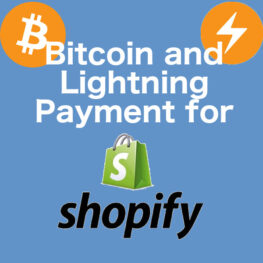
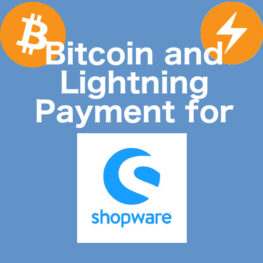
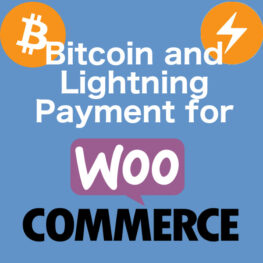

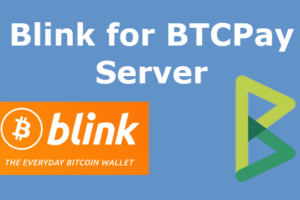


Leave a Reply
Your email is safe with us.